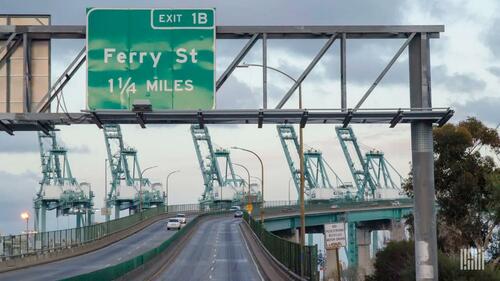
By John Kingston of FreightWaves
The injunction that kept California’s independent contractor law, AB5, out of the state’s trucking sector is officially dead.
In a hearing Monday, according to a statement released by trucking-focused law firm Scopelitis, Garvin, Light, Hanson & Feary, Federal District Court Judge Robert Benitez formally lifted the injunction that had been in effect since New Year’s Eve 2019. A filing by the court of its ruling was not available online at publication time.
The lifting of the injunction, which was expected, puts into effect an April 2021 U.S. 9th Circuit Court of Appeals ruling that overturned the original injunction handed down by Benitez. The appellate court ruling reversing the Benitez injunction nonetheless allowed the injunction to stay in place while the California Trucking Association, which filed the original lawsuit in the case, pursued its appeal to the U.S. Supreme Court.
When the high court chose not to review the case, California Trucking Association v. Bonta, that put it back into the hands of the appellate court. That court in turn handed down a mandate to the district court ordering the reversal of the injunction. The action Monday formalized that step.
But the case is not over. The legal arguments put forth by the CTA — that AB5 as applied to trucking in California violates parts of the Federal Aviation Administration Authorization Act — was only argued through motions on the injunction, rather than a full court procedure. The CTA will now pursue the case from the beginning and has asked for a new injunction. None was forthcoming Monday.
According to the Scopelitis memo, an earlier Benitez ruling that denied a CTA argument regarding AB5 and the Dormant Commerce Clause, which impacts interstate commerce, was vacated by Benitez, per the request of the CTA. The issue of whether the Owner Operator Independent Drivers Association (OOIDA) can intervene in the case remains to be decided.
Next steps are the filing of briefs in the case, which can take place into December, according to an earlier court filing.
AB5 requires workers be judged against the provisions of the so-called ABC test to settle the question of whether they are independent contractors or employee. In particular for trucking, the so-called B prong is troublesome, as it says an independent contractor must be involved in “work that is outside the usual course of the hiring entity’s business.” A trucking company hiring an outside truck driver runs the risk of being ruled in violation of the B prong.
The ruling did bring a quick media outreach from a public relations firm offering up commentary from the union side of the ledger.
“Today, drivers across California can rest easy knowing that trucking companies that have gotten away with misclassifying workers can no longer exploit their workers or the people of California to further their bottom line,” the email from Teamsters PR agency Berlin Rosen said. “These companies are going to be held accountable, and drivers’ rights will be protected under the law.”
By John Kingston of FreightWaves
The injunction that kept California’s independent contractor law, AB5, out of the state’s trucking sector is officially dead.
In a hearing Monday, according to a statement released by trucking-focused law firm Scopelitis, Garvin, Light, Hanson & Feary, Federal District Court Judge Robert Benitez formally lifted the injunction that had been in effect since New Year’s Eve 2019. A filing by the court of its ruling was not available online at publication time.
The lifting of the injunction, which was expected, puts into effect an April 2021 U.S. 9th Circuit Court of Appeals ruling that overturned the original injunction handed down by Benitez. The appellate court ruling reversing the Benitez injunction nonetheless allowed the injunction to stay in place while the California Trucking Association, which filed the original lawsuit in the case, pursued its appeal to the U.S. Supreme Court.
When the high court chose not to review the case, California Trucking Association v. Bonta, that put it back into the hands of the appellate court. That court in turn handed down a mandate to the district court ordering the reversal of the injunction. The action Monday formalized that step.
But the case is not over. The legal arguments put forth by the CTA — that AB5 as applied to trucking in California violates parts of the Federal Aviation Administration Authorization Act — was only argued through motions on the injunction, rather than a full court procedure. The CTA will now pursue the case from the beginning and has asked for a new injunction. None was forthcoming Monday.
According to the Scopelitis memo, an earlier Benitez ruling that denied a CTA argument regarding AB5 and the Dormant Commerce Clause, which impacts interstate commerce, was vacated by Benitez, per the request of the CTA. The issue of whether the Owner Operator Independent Drivers Association (OOIDA) can intervene in the case remains to be decided.
Next steps are the filing of briefs in the case, which can take place into December, according to an earlier court filing.
AB5 requires workers be judged against the provisions of the so-called ABC test to settle the question of whether they are independent contractors or employee. In particular for trucking, the so-called B prong is troublesome, as it says an independent contractor must be involved in “work that is outside the usual course of the hiring entity’s business.” A trucking company hiring an outside truck driver runs the risk of being ruled in violation of the B prong.
The ruling did bring a quick media outreach from a public relations firm offering up commentary from the union side of the ledger.
“Today, drivers across California can rest easy knowing that trucking companies that have gotten away with misclassifying workers can no longer exploit their workers or the people of California to further their bottom line,” the email from Teamsters PR agency Berlin Rosen said. “These companies are going to be held accountable, and drivers’ rights will be protected under the law.”





